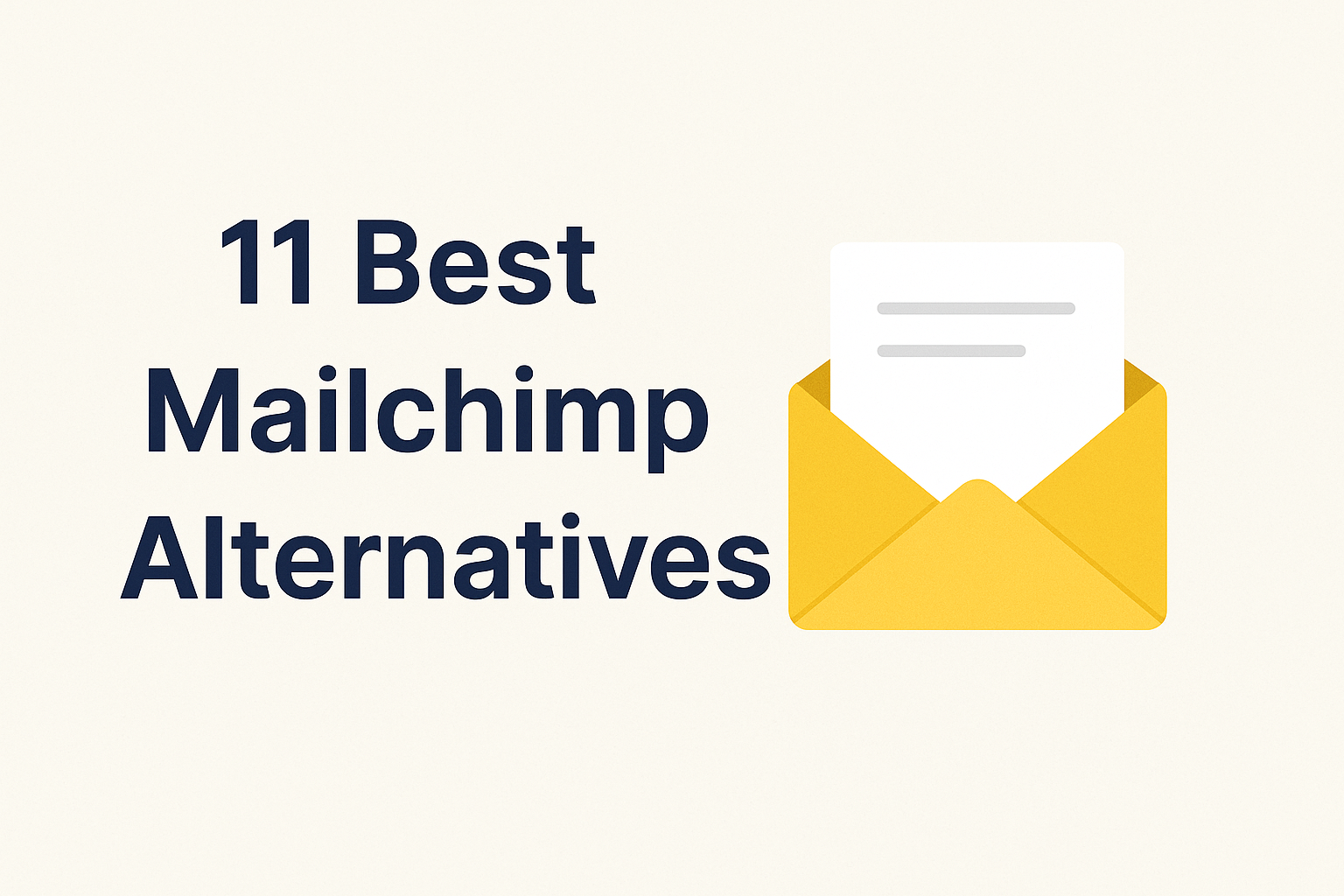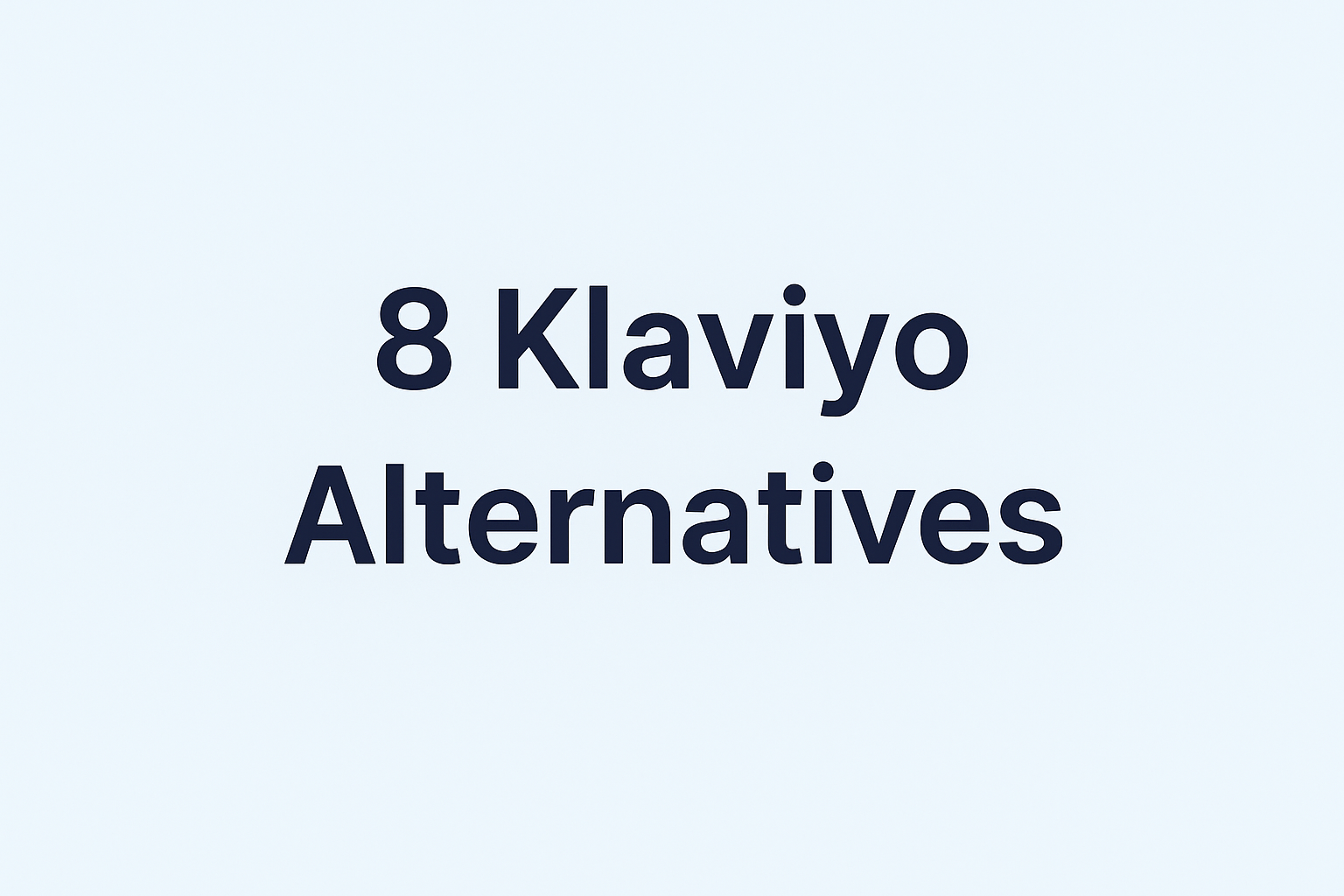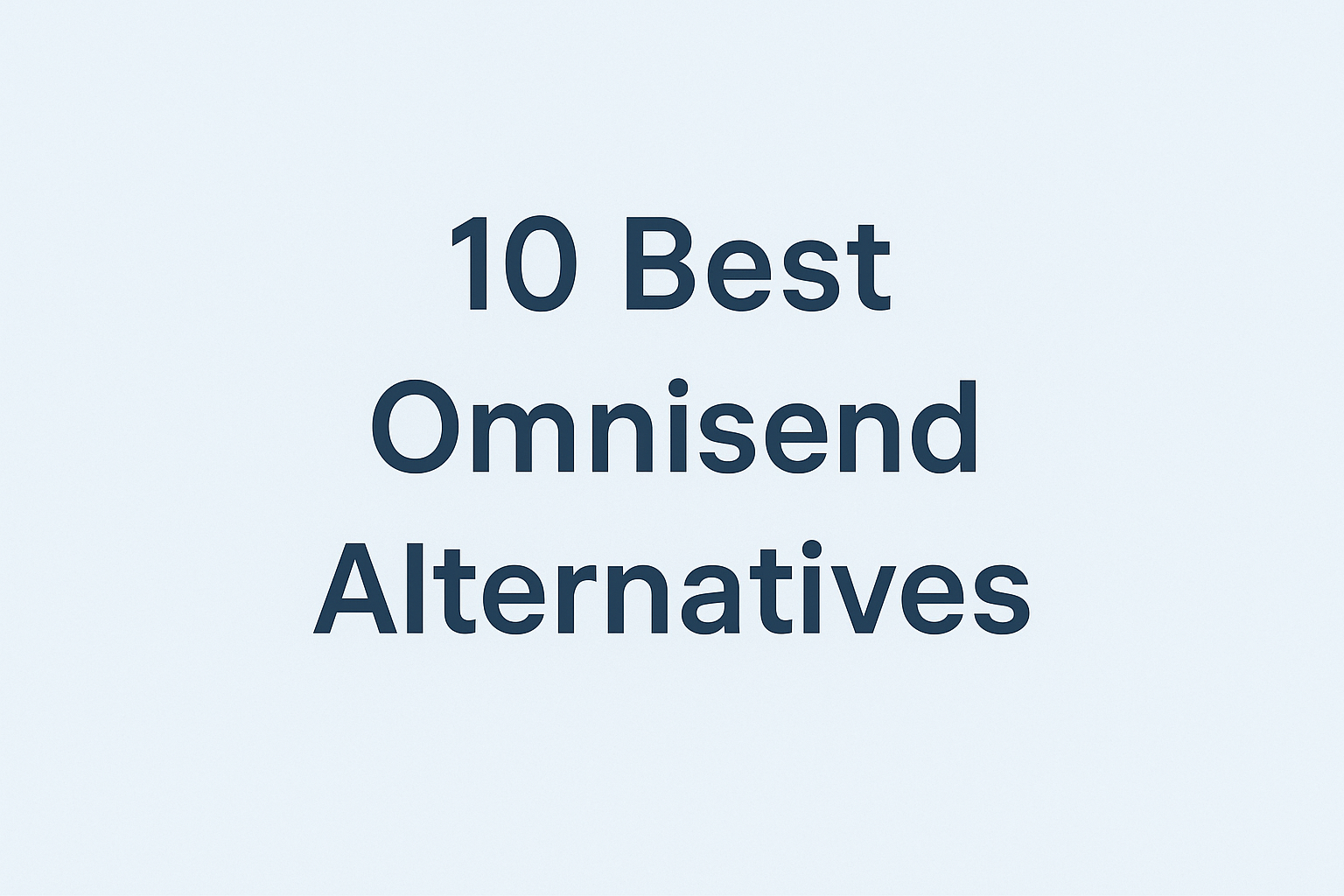The right email marketing platform can transform scattered marketing efforts into a cohesive revenue-generating machine. Yet choosing from hundreds of available options feels like navigating a digital labyrinth where every vendor claims superiority.
Email marketing delivers an average ROI of $42 for every $1 spent. But that statistic means nothing if you pick the wrong platform. The difference between a mediocre tool and an exceptional one often determines whether your campaigns generate meaningful revenue or disappear into spam folders.
This analysis examines the leading email marketing platforms based on technical capabilities, deliverability performance, automation sophistication, and real-world usability. Each platform serves different business needs, from startups requiring basic functionality to enterprise operations demanding advanced segmentation and analytics.
Table of contents
- Key features that define superior email marketing platforms
- Top email marketing platforms compared
- SelfMailKit: The developer-focused solution
- Omnisend: Ecommerce automation specialist
- Klaviyo: Data-driven marketing powerhouse
- ActiveCampaign: Advanced automation leader
- Mailchimp: The accessible all-rounder
- GetResponse: Marketing suite integration
- MailerLite: Simplicity meets functionality
- Brevo: Budget-friendly multichannel approach
- Constant Contact: Small business focused
- Platform selection criteria
- Pricing comparison and value analysis
- Making the right choice for your business
Key features that define superior email marketing platforms
Modern email marketing platforms must deliver far more than basic newsletter functionality. The best solutions integrate seamlessly with existing business systems while providing advanced automation capabilities that respond to customer behavior in real-time.
Deliverability represents the foundation of any email marketing strategy. A platform might offer impressive features, but if emails consistently land in spam folders, those features become irrelevant. Superior platforms maintain relationships with major ISPs, implement proper authentication protocols, and monitor reputation metrics continuously.
Template design capabilities separate amateur-looking campaigns from professional communications. The best platforms offer responsive templates that adapt across devices, drag-and-drop editors for customization, and the ability to create custom templates from scratch. Some platforms even provide AI-powered design suggestions based on industry benchmarks.
Automation sophistication distinguishes basic platforms from advanced marketing systems. Simple autoresponders handle welcome sequences, but sophisticated platforms create complex customer journeys based on purchase history, engagement patterns, and behavioral triggers. The most powerful systems support conditional logic, split testing within automations, and multi-channel coordination.
Segmentation accuracy directly impacts campaign performance. Basic platforms segment by demographics, while advanced systems analyze purchase patterns, engagement history, and behavioral data to create precise audience segments. The best platforms update segments dynamically as subscriber behavior changes.
Analytics depth determines how effectively marketers can optimize campaigns. Surface-level metrics like open rates provide limited insight, but comprehensive platforms track revenue attribution, customer lifetime value impact, and conversion paths across multiple touchpoints.
Integration capabilities affect platform usefulness within existing business ecosystems. The best platforms connect seamlessly with CRM systems, ecommerce platforms, analytics tools, and marketing automation suites. API availability allows custom integrations for unique business requirements.
Top email marketing platforms compared
The following table compares key features across leading email marketing platforms to help identify the best fit for different business needs:
| Platform | Starting Price | Free Plan | Automation Complexity | Ecommerce Features | Deliverability Score | Best For |
|---|---|---|---|---|---|---|
| SelfMailKit | $29/month | 14-day trial | Advanced | Excellent | Outstanding | Developers & tech teams |
| Omnisend | Free | Yes (500 emails) | Advanced | Excellent | Good | Ecommerce stores |
| Klaviyo | $20/month | Yes (500 contacts) | Moderate | Excellent | Good | Data-driven marketers |
| ActiveCampaign | $19/month | No | Advanced | Good | Excellent | Automation specialists |
| Mailchimp | $13/month | Yes (500 contacts) | Basic | Good | Moderate | Small businesses |
| GetResponse | $19/month | Yes (500 contacts) | Moderate | Good | Good | All-in-one marketers |
| MailerLite | Free | Yes (1,000 contacts) | Basic | Basic | Excellent | Budget-conscious users |
| Brevo | Free | Yes (300 daily emails) | Basic | Basic | Good | Multi-channel marketers |
| Constant Contact | $12/month | No | Basic | Basic | Good | Local businesses |
SelfMailKit: The developer-focused solution
SelfMailKit stands apart from traditional email marketing platforms by offering unparalleled flexibility and technical control. Built specifically for developers and technically-minded teams, it provides the infrastructure to create sophisticated email marketing systems without vendor lock-in.
The platform's architecture supports multiple deployment options. Teams can self-host the entire system for complete control, use managed cloud infrastructure for convenience, or connect their existing AWS SES setup to leverage Amazon's delivery network. This flexibility allows organizations to optimize costs while maintaining the technical control that traditional SaaS platforms cannot provide.
Technical advantages
SelfMailKit's API-first design enables custom integrations that would be impossible with conventional platforms. Developers can build exactly the functionality their business requires rather than adapting workflows to platform limitations. The system supports complex automation logic, custom data models, and integration with any external system through RESTful APIs.
The platform's deliverability infrastructure rivals enterprise-grade solutions. Built-in IP warming, reputation monitoring, and automatic bounce handling ensure optimal delivery rates. Advanced users can configure custom DKIM signatures, implement dedicated IP pools, and fine-tune delivery settings for specific campaigns.
Pricing structure
SelfMailKit's transparent pricing model charges based on actual usage rather than artificial subscriber limits. The base plan starts at $29 monthly for up to 10,000 emails, with scalable pricing that grows with business needs. Self-hosted deployments eliminate ongoing platform fees entirely after the initial setup.
Ideal use cases
Development teams building custom marketing systems find SelfMailKit particularly valuable. SaaS companies requiring transactional email integration, agencies managing multiple client campaigns, and enterprises with strict data sovereignty requirements benefit from the platform's technical flexibility.
The learning curve is steeper than consumer-focused platforms, but the technical capabilities justify the investment for teams with development resources. Documentation is comprehensive, and the support team understands complex technical requirements.
Omnisend: Ecommerce automation specialist
Omnisend focuses exclusively on ecommerce email marketing with features designed specifically for online retailers. The platform integrates seamlessly with major ecommerce platforms and provides sophisticated automation workflows tailored to shopping behaviors.
Ecommerce-specific features
Product recommendation engines analyze purchase history and browsing behavior to suggest relevant items in email campaigns. Abandoned cart recovery sequences trigger automatically when customers leave items in their shopping carts, with customizable timing and messaging strategies.
Customer segmentation goes beyond basic demographics to include purchase frequency, average order value, and product preferences. The platform can automatically create segments for VIP customers, at-risk subscribers, and prospects with high purchase potential.
Automation capabilities
Pre-built automation workflows handle common ecommerce scenarios like welcome series, post-purchase follow-ups, and re-engagement campaigns. Advanced users can create custom workflows with conditional logic based on customer behavior, purchase history, and engagement patterns.
SMS marketing integration allows coordinated campaigns across email and text messaging channels. Web push notifications provide another touchpoint for reaching customers who haven't provided email addresses.
Pricing and limitations
The free plan includes 500 emails monthly to 250 contacts with access to most features. Paid plans start at $16 monthly for 2,500 contacts with unlimited email sends. Higher-tier plans add advanced reporting, priority support, and increased sending limits.
Deliverability performance is adequate but not exceptional compared to specialized providers. The platform works best for retailers with established customer bases rather than businesses building lists from scratch.
Klaviyo: Data-driven marketing powerhouse
Klaviyo positions itself as a customer data platform with advanced email marketing capabilities. The system excels at collecting, analyzing, and acting on customer data to create highly personalized marketing campaigns.
Data management capabilities
The platform aggregates customer data from multiple sources including ecommerce platforms, mobile apps, and website interactions. Machine learning algorithms identify patterns in customer behavior to predict future actions and optimize campaign timing.
Predictive analytics features forecast customer lifetime value, churn probability, and optimal send times for individual subscribers. These insights enable marketers to allocate resources more effectively and personalize campaigns at scale.
Segmentation sophistication
Dynamic segments update automatically based on changing customer behavior. Marketers can create segments based on complex criteria combining purchase history, engagement patterns, and demographic data. The platform supports nested conditions and Boolean logic for precise audience targeting.
Behavioral triggers respond to specific customer actions like product views, cart additions, or subscription changes. These triggers can initiate multi-step campaigns that adapt based on subsequent customer behavior.
Template and design tools
Drag-and-drop email builders include AI-powered design suggestions based on industry benchmarks and campaign performance data. Dynamic content blocks automatically populate with personalized product recommendations, recently viewed items, or location-specific offers.
A/B testing capabilities extend beyond subject lines to test entire email designs, send times, and automation sequences. Statistical significance calculations ensure test results are reliable before implementing changes.
Pricing considerations
Free plans accommodate up to 250 contacts with 500 monthly emails. Paid plans begin at $20 monthly for 500 contacts with unlimited emails. Pricing scales based on contact count, with enterprise features available at higher tiers.
The platform charges for all contacts, including unsubscribed addresses, which can inflate costs compared to platforms that charge only for active subscribers.
ActiveCampaign: Advanced automation leader
ActiveCampaign specializes in sophisticated marketing automation with email capabilities that support complex customer journey mapping. The platform combines email marketing, CRM functionality, and advanced automation in a single system.
Automation sophistication
Visual automation builders allow marketers to create complex customer journeys with multiple decision points, wait conditions, and parallel paths. Automations can incorporate email, SMS, site messaging, and CRM updates within single workflows.
Machine learning optimization automatically adjusts send times, frequency, and content based on individual subscriber preferences. The system learns from campaign performance to improve future automation effectiveness.
CRM integration
Built-in CRM functionality tracks customer interactions across all touchpoints including email, website visits, and sales conversations. Lead scoring algorithms assign values based on engagement levels and buying signals to prioritize sales follow-up.
Sales automation features coordinate marketing campaigns with sales outreach to avoid conflicting messages. The system can automatically assign leads to sales representatives based on territory, product interest, or lead score.
Advanced features
Conditional content blocks display different information to different subscribers within the same email based on their data or behavior. This allows highly personalized campaigns without creating separate templates for each audience segment.
Attribution reporting tracks revenue generated by specific campaigns, automations, and individual emails. The system can calculate customer lifetime value impact and ROI for marketing activities.
Pricing structure
Plans start at $19 monthly for 500 contacts with basic automation features. Advanced automation, CRM functionality, and machine learning features require higher-tier plans starting at $49 monthly. Enterprise plans offer custom pricing for large contact lists.
No free plan is available, but a 14-day free trial allows full feature testing before committing to paid plans.
Mailchimp: The accessible all-rounder
Mailchimp balances ease of use with comprehensive marketing features, making it accessible to small businesses while offering advanced capabilities for growing companies. The platform has expanded beyond email to include social media management, digital advertising, and basic ecommerce tools.
User experience design
The interface prioritizes simplicity without sacrificing functionality. Campaign creation wizards guide users through template selection, audience targeting, and scheduling decisions. Drag-and-drop editors make customization straightforward even for users without design experience.
Pre-built automation templates handle common scenarios like welcome series and abandoned cart recovery. Users can customize these templates or create automations from scratch using visual workflow builders.
Multi-channel capabilities
Social media posting tools allow coordinated campaigns across email and social platforms. The system can automatically create social posts from email content or coordinate messaging across channels for consistent brand communication.
Digital advertising features create targeted ads on Facebook and Instagram using email subscriber data. Lookalike audiences help expand reach to prospects similar to existing customers.
Analytics and reporting
Campaign performance dashboards provide standard metrics like open rates, click rates, and unsubscribe rates. Advanced reports include audience growth trends, campaign comparisons, and revenue attribution for ecommerce integrations.
A/B testing capabilities cover subject lines, send times, and email content. The platform automatically sends winning variations to remaining subscribers based on performance criteria.
Pricing and limitations
Free plans support up to 500 contacts with 1,000 monthly emails. Paid plans start at $13 monthly for enhanced features and higher sending limits. Pricing increases based on contact count with enterprise features available at higher tiers.
The platform charges for inactive and unsubscribed contacts, which can increase costs compared to competitors that only charge for active subscribers. Advanced automation features require premium plans.
GetResponse: Marketing suite integration
GetResponse positions itself as a complete digital marketing platform combining email marketing with landing pages, webinars, and ecommerce tools. This integration approach appeals to businesses seeking comprehensive marketing solutions from single vendors.
All-in-one approach
Landing page builders create conversion-optimized pages that integrate directly with email campaigns. Templates span various industries and use cases, with drag-and-drop customization tools for brand alignment.
Webinar hosting capabilities support up to 1,000 attendees with automatic email integration for registration management and follow-up campaigns. Recorded webinars can be used as lead magnets or educational content.
Ecommerce integration
Built-in ecommerce tools allow businesses to create online stores directly within the platform. Product catalogs integrate with email campaigns for automated product promotion and abandoned cart recovery.
Conversion funnels guide prospects through complete purchase processes combining landing pages, email sequences, and checkout systems. Performance tracking identifies bottlenecks and optimization opportunities.
Automation features
Visual workflow builders create customer journeys combining email, SMS, and web push notifications. Conditional logic routes subscribers through different paths based on behavior, demographics, or engagement history.
Time-based triggers respond to specific dates, anniversaries, or subscription milestones. Behavioral triggers activate based on website visits, email engagement, or purchase activity.
Pricing considerations
Plans start at $19 monthly for 1,000 contacts with basic features. Ecommerce functionality requires higher-tier plans starting at $59 monthly. Enterprise features and higher contact limits increase pricing significantly.
Free plans include limited functionality with GetResponse branding on emails and landing pages. Full feature access requires paid subscriptions.
MailerLite: Simplicity meets functionality
MailerLite focuses on providing powerful email marketing tools through an intuitive interface that newcomers can master quickly. The platform offers generous free plans and transparent pricing that appeals to budget-conscious businesses.
User-friendly design
Campaign creation processes minimize complexity while maintaining customization options. Template libraries include modern designs optimized for mobile devices. Drag-and-drop editors allow customization without technical skills.
Automation builders use simple visual interfaces to create subscriber journeys. Pre-built automation templates handle common scenarios like welcome sequences and re-engagement campaigns.
Advanced features on free plans
Free accounts include automation capabilities, A/B testing, and basic reporting for up to 1,000 subscribers. This generous free tier allows small businesses to access advanced features typically reserved for paid plans on other platforms.
Custom HTML editing provides flexibility for users with coding skills while maintaining the visual editor for those without technical backgrounds. Landing page builders create conversion-optimized pages that integrate with email campaigns.
Deliverability performance
MailerLite consistently achieves high deliverability rates in independent testing. The platform maintains strong relationships with major ISPs and implements best practices for reputation management.
Built-in spam testing analyzes campaigns before sending to identify potential deliverability issues. Sender reputation monitoring helps maintain high delivery rates over time.
Pricing transparency
Free plans support unlimited monthly emails to up to 1,000 subscribers. Paid plans start at $9 monthly for enhanced features and higher subscriber limits. Pricing scales linearly with subscriber count without hidden fees or feature restrictions.
Annual payment discounts reduce costs further, making MailerLite one of the most affordable options for businesses with larger subscriber lists.
Brevo: Budget-friendly multichannel approach
Brevo (formerly Sendinblue) combines email marketing with SMS, WhatsApp, and transactional email capabilities. The platform targets businesses seeking multichannel marketing tools at budget-friendly prices.
Multichannel integration
SMS marketing tools coordinate with email campaigns for comprehensive customer communication. WhatsApp Business integration enables customer service and marketing through popular messaging platforms.
Transactional email services handle order confirmations, password resets, and other automated communications. Dedicated IP options improve deliverability for high-volume senders.
Automation capabilities
Workflow builders create customer journeys across multiple channels. Triggers can initiate campaigns based on email engagement, website behavior, or CRM data updates.
Marketing automation includes lead scoring, contact segmentation, and personalized content delivery. Advanced features like A/B testing and conversion tracking help optimize campaign performance.
CRM functionality
Built-in CRM tools track customer interactions and sales pipeline progression. Integration with email campaigns provides context for personalized communications based on sales stage and customer history.
Contact management features organize customer data and interaction history. Custom fields and tags enable detailed segmentation and personalization strategies.
Pricing advantages
Free plans include 300 daily emails with unlimited contacts. Paid plans start at $9 monthly for enhanced features and higher sending limits. SMS and WhatsApp messaging incur additional per-message charges.
The generous free tier makes Brevo attractive for businesses testing multichannel marketing approaches without significant upfront investment.
Constant Contact: Small business focused
Constant Contact targets small businesses and local organizations with user-friendly tools and extensive support resources. The platform emphasizes ease of use over advanced features, making it accessible to marketing newcomers.
Small business orientation
Template libraries include designs for local businesses, nonprofits, and professional services. Industry-specific templates provide starting points for common business types.
Event management tools coordinate with email campaigns for event promotion and attendee communication. Survey tools gather customer feedback that can inform future marketing efforts.
Support and education
Extensive educational resources include video tutorials, best practice guides, and live training sessions. Phone support provides direct assistance during business hours.
Marketing advisors offer strategic guidance for campaign planning and list building. This personalized support differentiates Constant Contact from platforms offering only online resources.
Integration capabilities
Social media integration allows coordinated campaigns across email and social platforms. E-commerce integrations support online retailers with product promotion and abandoned cart recovery.
Contact management tools import from various sources and maintain clean subscriber lists. Segmentation options support targeted campaigns based on customer characteristics and behavior.
Pricing and value
Plans start at $12 monthly for 500 contacts with unlimited emails. Higher tiers add advanced features like automation and detailed reporting. Annual payments reduce costs with significant discounts.
No free plan is available, but 30-day free trials allow full feature evaluation before purchase commitments.
Platform selection criteria
Choosing the right email marketing platform requires careful evaluation of business needs, technical requirements, and growth projections. The best platform for one business may be poorly suited for another with different priorities and constraints.
Business size and complexity
Small businesses with simple needs may find basic platforms like MailerLite or Constant Contact sufficient for their requirements. These platforms offer essential features without overwhelming complexity or high costs.
Medium-sized businesses often benefit from platforms like Mailchimp or GetResponse that balance ease of use with advanced capabilities. These solutions can grow with business needs while remaining manageable for non-technical users.
Large enterprises typically require platforms like ActiveCampaign or SelfMailKit that offer sophisticated automation, integration capabilities, and scalable infrastructure. Technical complexity becomes less important when development resources are available.
Industry-specific requirements
Ecommerce businesses benefit from platforms like Omnisend or Klaviyo that offer specialized features for online retailers. Product recommendation engines, abandoned cart recovery, and purchase-based segmentation provide significant value for online stores.
B2B companies often prefer platforms with strong CRM integration and lead scoring capabilities. ActiveCampaign and HubSpot excel in these areas with features designed for longer sales cycles and relationship-based selling.
Service businesses may prioritize appointment scheduling integration and client communication tools. Some platforms offer specialized features for specific service industries like healthcare, legal services, or consulting.
Technical capabilities and integration needs
Businesses with development resources can leverage platforms like SelfMailKit that offer API access and customization capabilities. These platforms provide flexibility to create unique marketing systems tailored to specific business processes.
Companies with complex technology stacks need platforms that integrate seamlessly with existing systems. API availability, webhook support, and pre-built integrations become critical selection factors.
Organizations with strict data governance requirements may prefer self-hosted solutions or platforms with specific compliance certifications. Data sovereignty and security features may outweigh other considerations.
Pricing comparison and value analysis
Email marketing platform pricing varies significantly based on feature sets, contact limits, and value-added services. Understanding pricing structures helps identify the best value for specific business needs and growth projections.
Pricing model variations
Contact-based pricing charges based on subscriber list size regardless of email volume. This model works well for businesses with engaged lists that require frequent communication.
Email-based pricing charges per message sent rather than contacts stored. This approach benefits businesses with large lists but infrequent sending patterns.
Feature-based pricing tiers unlock advanced capabilities at higher price points. Businesses can start with basic plans and upgrade as needs become more sophisticated.
Hidden costs and considerations
Some platforms charge for inactive or unsubscribed contacts, inflating costs for businesses with list churn. Others only charge for active subscribers, providing better value for businesses with natural list turnover.
Overage fees apply when usage exceeds plan limits. Understanding these charges helps avoid unexpected costs during campaign spikes or list growth periods.
Advanced features may require premium plans regardless of list size. Businesses needing specific capabilities should evaluate feature availability across pricing tiers.
Total cost of ownership
Implementation costs include setup time, template creation, and integration development. Platforms with steep learning curves may require additional training or consultant support.
Maintenance costs encompass ongoing campaign management, list hygiene, and performance optimization. User-friendly platforms reduce these ongoing operational costs.
Opportunity costs result from platform limitations that prevent optimal campaign performance. Choosing platforms that match business needs prevents these hidden costs from accumulating.
Making the right choice for your business
The best email marketing platform combines the right features, pricing, and usability for your specific business context. No single platform excels in every area, so prioritizing requirements helps identify the optimal solution.
SelfMailKit emerges as the top choice for technically sophisticated teams requiring maximum flexibility and control. The platform's API-first architecture and deployment options provide capabilities that traditional SaaS platforms cannot match.
Ecommerce businesses should seriously consider Omnisend or Klaviyo for their specialized retail features. These platforms understand online commerce workflows and provide tools specifically designed for driving sales through email marketing.
Small businesses seeking simplicity and value will find MailerLite or Brevo most appealing. These platforms offer generous free tiers and straightforward interfaces that don't require extensive training or technical expertise.
Growing businesses need platforms that can scale with their success. ActiveCampaign and Mailchimp provide upgrade paths that add sophisticated features as marketing needs become more complex.
The decision ultimately depends on weighing feature requirements against budget constraints while considering long-term growth plans. Most platforms offer free trials or free tiers that allow hands-on evaluation before making commitments.
Ready to experience the power of flexible email marketing infrastructure? Try SelfMailKit and discover how developer-friendly email marketing can transform your business communications. Whether you need self-hosted control, managed cloud convenience, or AWS SES integration, SelfMailKit provides the technical foundation for sophisticated email marketing success.






